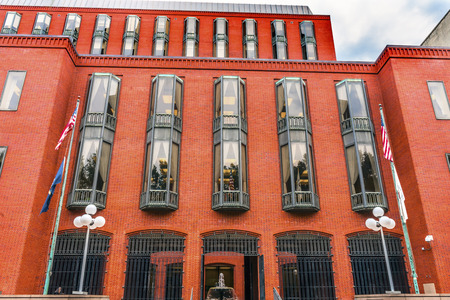The application of these decisions will have immediate effects on defendants in patent infringement cases, and particularly those who are often subject to suit in popular districts like the Eastern District of Texas and the District of Delaware.

Photos Source: Deposit Photos
The Federal Circuit issued a trio of decisions this month further clarifying the application of the patent venue statute in the post-TC Heartland era.
The case specifics are: In re HTC Corporation, No. 2018-130 (May 9, 2018); In re ZTE (USA) Inc., No. 2018-113 (May 14, 2018); and In re BigCommerce, Inc., No. 2018-120 (May 15, 2018). In those cases, the Federal Circuit held:
- Non-U.S. entities are outside the limits of the patent venue statute.
- Federal Circuit law governs the placement of the burden of persuasion on the propriety of venue.
- Domestic corporations that are incorporated in states having multiple judicial districts only “reside” in the district in which they maintain a principal place of business for purposes of the patent venue statute.
These developments in patent venue law are likely to be of interest to companies who may find themselves subject to complaints for patent infringement in districts such as the Eastern District of Texas or the District of Delaware.
In re HTC – Alien-venue
In re HTC Corporation presented an opportunity for the Federal Circuit to reiterate the long-standing principle that aliens (non-U.S. entities) are outside general and special venue statutes and may be subject to suit in any judicial district. The question of alien-venue in patent cases originally arose out of Fourco Glass Co. v. Transmirra Products Corp., 355 U.S. 222 (1957), in which the Supreme Court held that the patent venue statute was the “sole and exclusive provision controlling venue in patent infringement actions.” 353 U.S. at 229.
The patent venue statute, however, did not address alien defendants who neither “resided” nor had a “regular and established place of business” in any district of the United States. Although the general venue statute included an express provision—then 28 U.S.C. § 1391(d)—that aliens were subject to suit in any district, Fourco’s direction that the patent venue statute stood independently suggested a venue gap for patent infringement cases against aliens.
The Supreme Court avoided that result in Brunette Machine Works, Ltd. v. Kockum Industries, Inc., 406 U.S. 706 (1972), by explaining that § 1391(d) was not really “an appendage to the general venue statutes,” but rather simply a reflection of “the longstanding rule that suits against alien defendants are outside those statutes.” 406 U.S. at 713. “[S]uits against aliens are wholly outside the operation of all the federal venue laws, general and special.” Id. at 714.
For more than 40 years, alien-venue in patent cases was a settled question. In HTC, the defendant argued that the passage of the Federal Courts Jurisdiction and Venue Clarification Act of 2011 reopened the question by revising and reorganizing the general venue statute, including by eliminating § 1391(d) and changing the treatment of aliens. Citing the legislative history, the defendant argued that Congress intended to change the treatment of aliens within the general venue statute and overrule the principle that suits against alien defendants are outside both general and special venue statutes.
The Federal Circuit rejected these arguments. First, it reasoned that the patent venue statute “governs only to displace otherwise-applicable venue standards, not where there are no such standards due to the alien-venue rule.” The question, then, was whether Congress intended the 2011 amendments “to abrogate the centuries-old rule that all venue laws, both general and special, do not apply to suits against alien defendants.” Finding insufficient indications of such an intent, which would otherwise have created a venue gap for foreign defendants, the Federal Circuit held that the rule as articulated in Brunette continues to apply.
In re ZTE – Governing law and the burden of persuasion
The Federal Circuit’s decision in In re ZTE may significantly strengthen defendants’ arguments against venue in the Eastern District of Texas, which has seen a flood of venue motions following last year’s TC Heartland decision. Relying on Fifth Circuit law, the district court has required objecting defendants to establish the impropriety of venue. Granting a petition for mandamus, the Federal Circuit first held that “[w]hether venue is proper under § 1400(b) is an issue unique to patent law and is governed by Federal Circuit law.” Turning then to the ultimate question, the Federal Circuit held “as a matter of Federal Circuit law that, upon motion by the Defendant challenging venue in a patent case, the Plaintiff bears the burden of establishing proper venue.”
Given that the district court had not viewed the defendant’s venue challenge through this framework, the Federal Circuit granted the petition for mandamus, vacated the denial of the motion to dismiss, and instructed the court to reconsider the defendant’s motion with the burden of persuasion on the plaintiff. Previously, the Eastern District of Texas appeared uniform in its requirement of defendants to essentially disprove the propriety of venue. The defendants may now find it easier to challenge venue in patent cases as the onus shifts to plaintiffs to demonstrate that defendants either reside in the district or else have committed infringing acts while having a regular and established place of business in the district. The decision may also have the unintended result of slowing down the consideration of venue motions as the court may be inundated by re-urged motions that had previously been decided under the now-vacated standard.
In re BigCommerce – Residence in States with Multiple Districts
While TC Heartland reestablished the rule that, for purposes of the venue statute, “where the defendant resides” means only the state in which the defendant is incorporated, it left open the question of how to treat defendants incorporated in states that have more than one judicial district. The issue came to the fore in BigCommerce, in which the defendant was incorporated in the State of Texas and had a principal place of business in the Western District of Texas, but had been sued for patent infringement in the Eastern District of Texas. The defendant moved to dismiss, arguing that it did not reside in the Eastern District of Texas because it had no place of business there.
The district court denied the motion, reasoning that “a domestic corporation resides in the state of its incorporation and if that state contains more than one judicial district, the corporate defendant resides in each such judicial district for venue purposes.” The Federal Circuit overruled it, however, and found that the patent venue statue spoke of residence-based-venue being appropriate “in only one particular judicial district.” The Federal Circuit found support for this interpretation in the legislative history of the statute itself and in the policy considerations underlying the statute and its progeny of cases interpreting its application. Thus, the appellate court held that a domestic corporation resides either in the district in which it has its principal place of business or, if it has no principal place of business in the state, then in the district in which its registered office is located.
Conclusion
The Federal Circuit’s recent venue decisions represent important developments in the interpretation of the patent venue statute. The application of these decisions will have immediate effects on defendants in patent infringement cases, and particularly those who are often subject to suit in popular districts like the Eastern District of Texas and the District of Delaware. While many open questions remain—perhaps most notably the treatment of domestic unincorporated associations—the Federal Circuit continues to delineate the scope of the patent venue statute.

![[IPWatchdog Logo]](https://ipwatchdog.com/wp-content/themes/IPWatchdog%20-%202023/assets/images/temp/logo-small@2x.png)

![[[Advertisement]]](https://ipwatchdog.com/wp-content/uploads/2024/04/Patent-Litigation-2024-banner-938x313-1.jpeg)
![[Advertisement]](https://ipwatchdog.com/wp-content/uploads/2024/04/UnitedLex-May-2-2024-sidebar-700x500-1.jpg)
![[Advertisement]](https://ipwatchdog.com/wp-content/uploads/2024/04/Artificial-Intelligence-2024-REPLAY-sidebar-700x500-corrected.jpg)
![[Advertisement]](https://ipwatchdog.com/wp-content/uploads/2024/04/Patent-Litigation-Masters-2024-sidebar-700x500-1.jpg)

![[Advertisement]](https://ipwatchdog.com/wp-content/uploads/2021/12/WEBINAR-336-x-280-px.png)
![[Advertisement]](https://ipwatchdog.com/wp-content/uploads/2021/12/2021-Patent-Practice-on-Demand-recorded-Feb-2021-336-x-280.jpg)
![[Advertisement]](https://ipwatchdog.com/wp-content/uploads/2021/12/Ad-4-The-Invent-Patent-System™.png)






Join the Discussion
No comments yet.